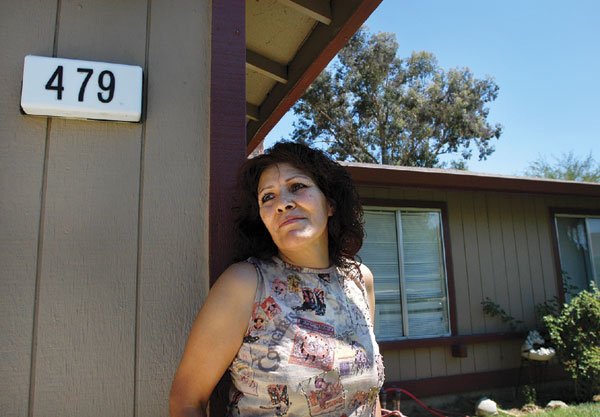Juliana Velazquez claims she’s paying off a loan she never
signed
– a refinancing scheme that bumped her mortgage from $225,000 to
$277,000.
Gilroy – Juliana Velazquez claims she’s paying off a loan she never signed – a refinancing scheme that bumped her mortgage from $225,000 to $277,000.
Puzzled by the bloated mortgage statement that landed in her Madison Court mailbox this spring, the Gilroy woman stopped into a bank, where a loan officer explained she’d refinanced her home.
The problem is, Velazquez claims she never did.
Wednesday, the Gilroy woman filed suit against her broker, E. Anthony Alfaro, and his then-employer, JD Financial Mortgage Inc., claiming Alfaro forged her signature to refinance her home, pocketed the fees, and bilked her of $26,000 deposited by her lender in her account after the refinancing, convincing her to reimburse him for the “accidentally” deposited funds.
A closing statement provided by Velazquez’ attorney, Judi Silverstein, shows Alfaro received at least $7,925 in fees for the June refinancing.
“Others created these problems,” said Velazquez, speaking in Spanish, “but I have to pay the consequences.”
Alfaro could not be reached at any of the phone numbers or e-mail addresses he had previously given to Velazquez. JD Financial staff declined to comment, as did the company’s attorney, Bruce Piontkowski. It is unclear whether Alfaro still works for JD Financial.
“I’ve never seen anything like this,” said Silverstein, who has practiced law for 11 years. To successfully falsify the loan, a broker would have to get it certified by a notary, she said. Silverstein has yet to obtain the papers to identify the notary involved. “Somebody dropped the ball – either intentionally, or just asleep at the wheel.”
Checks sent to broker when lender went bankrupt
The forged loan is only one of several charges Velazquez and Silverstein have brought against Alfaro. When the Gilroy woman’s lender, New Century Financial, went bankrupt this April, Velazquez claims Alfaro told her to write her mortgage payments directly to him, so that he could pay the sums to the new lender.
“He told me, ‘Everything will be fine, don’t worry,’ ” Velazquez said.
Silverstein was unsure of the exact number of payments Velazquez sent to Alfaro, but estimated they exceeded $6,000, only a portion of which was actually paid to Velazquez’ new lender, she said.
When a lender goes bankrupt, the company is required to send a letter to the borrower informing them, and letting them know who holds the loan, said Tom Pool, spokesman for the state Department of Real Estate. Velazquez couldn’t recall if she had received any such letters. Pool said he knew of no legitimate reason a broker would ask to receive mortgage checks.
Velazquez is seeking at least $550,000 in total damages, Silverstein said.
Alfaro is not licensed by the Department of Real Estate, said Pool. JD Financial is licensed as a California Financial Lender, he explained, which does not require its loan officers to be licensed.
A past business associate of Alfaro’s, speaking on condition of anonymity, said he was surprised to hear Alfaro accused of fraud.
“He’s a pretty good guy,” said the associate, “but then again, the mortgage business has tightened up a bit. A lot of people are feeling the pinch.”
Fraud “so easy to commit,” expert says
Velazquez’ story isn’t rare, said Robert Aldana, a real estate agent and former vice chairman of the California Association of Realtors. Aldana hosts a talk radio show in Santa Cruz on KSCO 1080 AM, “Let’s Talk Real Estate,” that highlights housing scams.
“Fraud is so easy to commit,” said Aldana, who knew of several South Bay cases similar to Velazquez’. In one case, cited on Aldana’s blog, a broker used a family’s information, purchased a $900,000 home for his own family, and stopped making payments, stranding his clients with the foreclosure notice. “Especially if a broker has already worked with someone. He’s already got their signature and their Social Security numbers. If he can find a notary to sign it, it’s simple. There’s not a lot of safeguards out there.”
Some lenders confirm a loan directly with the borrower, said Pool, but the practice isn’t common. David Ziel, operations manager of Old Republic Title Company, called notaries “the main line of defense” against fraud.
Still, said Pool, “if someone is bent on breaking the law, obviously there’s ways around safeguards.”
Velazquez gestured to her heart, speaking of the anxiety she feels, trying to make the roughly $1,500 payments on her new loan. As a machine operator at Gilroy Foods, she earns about $19 an hour, processing garlic and onions. Hers is the sole income paying for her Gilroy home. Thank goodness, she said, her children are grown.
“I get up, I go to work,” she said, “and I worry that when I come home, I won’t have a house.”















